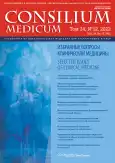Differential clinical signs of aphasia syndrome in acute and residual recovery periods. Directions of neurorehabilitation of patients with aphasia syndrome depending on the recovery period
- Authors: Shcherbakova M.M.1
-
Affiliations:
- Vladimirsky Moscow Regional Research Clinical Institute
- Issue: Vol 24, No 12 (2022)
- Pages: 888-892
- Section: Articles
- URL: https://journals.rcsi.science/2075-1753/article/view/144228
- DOI: https://doi.org/10.26442/20751753.2022.12.201952
- ID: 144228
Cite item
Full Text
Abstract
Background. Speech and cognitive disorders of vascular genesis account for a significant percentage of the existing consequences of local disorders of cerebral circulation. Approximately 21–40% of stroke patients suffer from persistent aphasia, which gradually worsens the quality of life and rehabilitation results.
Aim. Improving the quality of neurorehabilitation of patients who have suffered a brain stroke.
Materials and methods. The analysis of differential clinical signs of aphasia syndrome in patients of neuro-intensive care and vascular neurological departments was carried out. The typical clinical symptoms of aphasia syndrome characteristic of ICU patients were identified, a rehabilitation direction was proposed that promotes rapid compensation of syndromes in the acute recovery period (up to 88% of cases). The clinical signs of aphasia syndrome at the late, residual recovery stage have been clarified. An effective method of neurorehabilitation of patients with aphasia syndrome in the late recovery period (significant positive dynamics up to 85% of cases) is proposed.
Results. Achieved high results in the reversibility of the aphasia syndrome, both at an early and late, residual, recovery stage.
Conslusion. Aphasia syndrome in acute and residual recovery periods has a certain specificity of its clinical manifestation. This factor must be taken into account: 1) when making speech diagnoses; 2) when planning rehabilitation programs. An effective rehabilitation technique for the aphasia syndrome involves a functional reorganization of mental processes, which allows speech thinking to either completely return or get as close as possible to its original state, regardless of the stage of recovery work.
Full Text
##article.viewOnOriginalSite##About the authors
Maria M. Shcherbakova
Vladimirsky Moscow Regional Research Clinical Institute
Author for correspondence.
Email: mmsch@mail.ru
ORCID iD: 0000-0001-5923-5355
Cand. Sci. (Med.), Vladimirskiy Moscow Regional Research Clinical Institute
Russian Federation, MoscowReferences
- Косивцова О.В., Захаров В.В. Постинсультные афазии: клиническая картина, дифференциальный диагноз, лечение. Эффективная фармакотерапия. 2017;1(1):10-38 [Kosivtsova OV, Zakharov VV. Post-stroke aphasia: clinical picture, differential diagnosis, treatment. Effektivnaia farmakoterapiia. 2017;1(1):10-38 (in Russian)].
- Шишкова В.Н., Зотова Л.И., Малюкова Н.Г., и др. Новые возможности в медикаментозной терапии постинсультной афазии. Лечащий врач. 2019;2:64-9 [Shishkova VN, Zotova LI, Malyukova NG, et al. New possibilities in drug therapy of post-stroke aphasia. Lechaschi Vrach. 2019;2:64-9 (in Russian)].
- Смирнов М.В., Усанова Т.А., Фирсов А.А. Речевые нарушения в остром периоде ишемического инсульта. Медицинский альманах. 2013;1(25):114-6 [Smirnov MV, Usanova TA, Firsov AA. Speech disorders in the acute period of ischemic stroke. Meditsinskii al'manakh. 2013;1(25):114-6 (in Russian)].
- Hillis AE, Wityk RJ, Barker PB, et al. Subcortical aphasia and neglect in acute stroke: the role of cortical hypoperfusion. Brain. 2002;125(5):1094-104. doi: 10.1093/brain/awf113
- Saxena S, Lawley D. Delirium in the elderly: a clinical review. Postgrad Med J. 2009;85(1006):405-13. doi: 10.1136/pgmj.2008.072025
- Гельфанд Б.Р., Линев Д.В., Ярошецкий А.И., и др. Делирий у больных в критических состояниях: критерии оценки тяжести, прогноз, лечение. Анналы хирургии. 2016;21(1-2):60-73 [Gel'fand BR, Linev DV, Iaroshetskii AI, et al. Delirium in patients in critical conditions: criteria for assessing the severity, prognosis, treatment. Annaly khirurgii. 2016;21(1-2):60-73 (in Russian)]. doi: 10.18821/1560-9502-2016-21-1-60-73
- Попугаев К.А., Савин И.А., Лубнин А.Ю., и др. Делирий в реаниматологической практике. Обзор литературы. Анестезиология и реаниматология. 2012;4:19-27 [Popugaev KA, Savin IA, Lubnin AIu, et al. Delirium in neurointensive care unit. Literature review. Anesteziologiia i reanimatologiia. 2012;4:19-27 (in Russian)].
- Кутлубаев М.А., Ахмадеева Л.Р., Бикбулатов Л.Ф. Делирий в остром периоде церебрального инсульта: частота развития и предрасполагающие факторы. Журнал неврологии и психиатрии им. C.C. Корсакова. 2013;113(3-2):37-41 [Kutlubaev MA, Akhmadeeva LR, Bikbulatova LF. Delirium in the acute phase of stroke: frequency and predisposing factors. Zhurnal nevrologii i psikhiatrii imeni S.S. Korsakova. 2013;113(3-2):37-41 (in Russian)].
- Щербакова М.М. Диагностика речевых и когнитивных нарушений сосудистого генеза. Учебно-методическое пособие. М.: ГБУЗ МО МОНИКИ им. М.Ф. Владимирского, 2022 [Shcherbakova MM. Diagnostika rechevykh i kognitivnykh narushenii sosudistogo geneza. Uchebno-metodicheskoe posobie. Moscow: GBUZ MO MONIKI im. MF. Vladimirskogo, 2022 (in Russian)].
- Щербакова М.М., Котов С.В. Методика скрининг-диагностики больных с афазией. Consilium Medicum. 2015;17(2):8-11 [Scherbakova MM, Kotov SV. Screening method for examination of patient with aphasia. Consilium Medicum. 2015;17(2):8-11 (in Russian)]. doi: 10.26442/2075-1753_2015.2.8-11
- Хомская Е.Д. Нейропсихологическая диагностика. М.: Институт общегуманитарных исследований, 2004 [Khomskaia ED. Neiropsikhologicheskaia diagnostika. Moscow: Institut obshchegumanitarnykh issledovanii, 2004 (in Russian)].
- Щербакова М.М. Когнитивные нарушения и их реабилитация в неврологической клинике (психологический подход). М.: Изд-во В. Секачев, 2021 [Shcherbakova MM. Kognitivnye narusheniia i ikh reabilitatsiia v nevrologicheskoi klinike (psikhologicheskii podkhod). Moscow: Izd-vo V. Sekachev, 2021 (in Russian)].
Supplementary files






